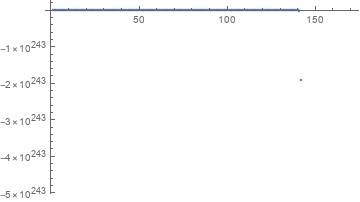The copy of this question is posted here
I have tried to to determine values of real $x$ for which $\sum\limits_{n=0}^{\infty}x^{\tan(n!)-n!}$ converges but I can't , Presumably the set of values $\{ n! \bmod 2\pi\mathbb Z\}$ is dense in $[0,2\pi]$ then $\tan(n!)$ will be large arbitrarily infinitely often, and the difference $\tan(n!)-n!$ would be probably small. However I don't know anything about limit of the fraction $\frac{\tan(n!)}{n!}$ for large $n$, And I have used Stiriling formula but it weren't helpful, This really forbide me to determine how $x$ values should be to get the titled series converge, then my question is :
Question: For which values of real number $x$ we have $\sum\limits_{n=0}^{\infty}x^{\tan(n!)-n!}$ converges ? We may avoid trivial case $x=0$ , In particular how we prove the set of values $\{ n! \bmod 2\pi\mathbb Z\}$ is dense in $[0,2\pi]$ ?
Note:I have used this trick for approximation : $n! = e(-1)^{n+1}/(n+1) + O(1/n^2) (\mod \mathbb Z)$ implies that $\tan(\pi n!)-n!=\pi e((-1)^{n+1}/(n+1) + O(1/n^2)) -\frac{1}{\pi})(\mod \mathbb Z)$ but this what could saying to me ? Probably conditional convergence could be happen here .
Addedendum
I'm interested to evaluate the above series because this need to prove $\{ n! \bmod 2\pi\mathbb Z\}$ is dense in $[0,2\pi]$ which is related to irrationality measure and Bounds approximation of $\pi$ which it is interesting in number theory and in the same time looking to the behavior of $\tan(n!)-n!$ for large $n$ which it help to get bounds for some arithmitic functions , Also to loook to the relationship of convergence of series to lacunar Fourier series which we have a lot of results on convergence for them
using mathematica code for $n=400$, $\tan(n!)-n!$ I have got the below plot and this is the code ,
Block[{$MaxExtraPrecision = 800},
lst = Table[Tan[n!] - n!, {n, 0, 400}];
ListPlot[N[Accumulate[lst], 200], PlotRange -> All]
]

